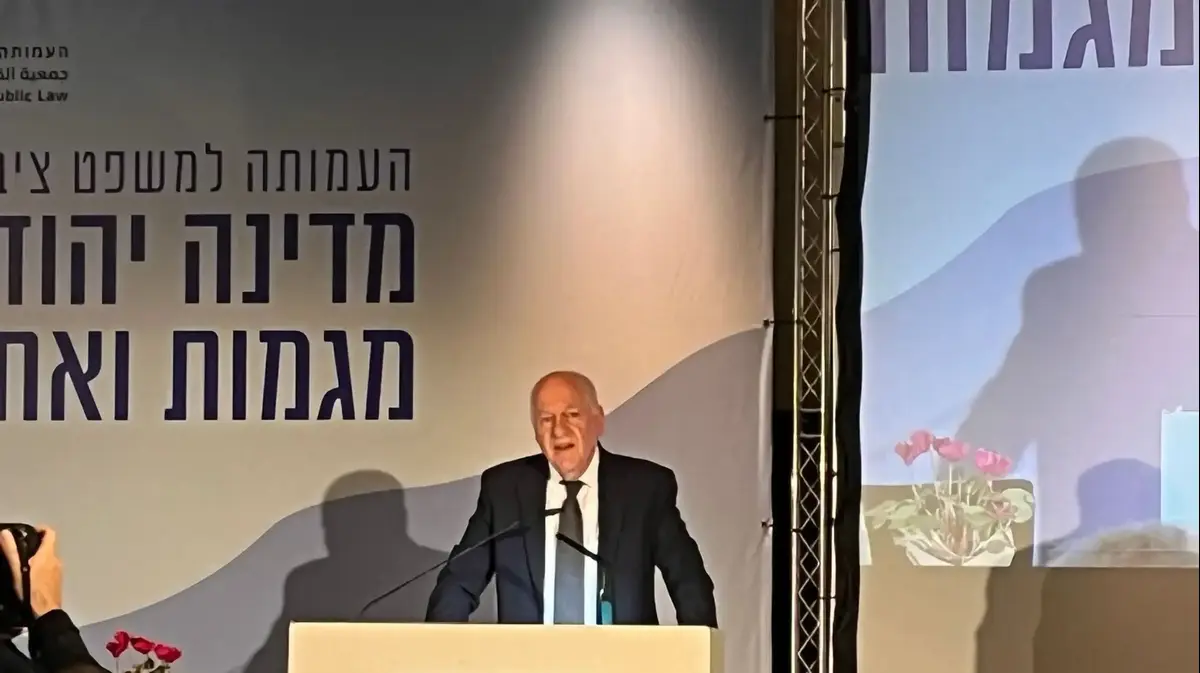JERUSALEM - As part of a recent "national day of resistance," a group of masked army reservists converged on the Jerusalem office of a think tank and blocked its front door with sandbags and coils of barbed wire.
Outside, protesters staged a noisy rally in the street, waving dozens of banners and sharing a microphone to deliver a series of angry speeches.
"The
Kohelet Political Forum
has hidden in the shadows," a speaker yelled from the top of a car.
"But we're on top of them and we won't let them win."
The Kohelet office building seen from Har Aamenuchot, the largest cemetery in Jerusalem, Israel, (Avishag Shaar-Yashuv/The New York Times)
For years, Kohelet has quietly published position papers, trying to steer government policy in a more
libertarian
direction .
Then, starting in January, he became better known as one of the main architects of the judicial reform proposal that has plunged Israel into a crisis over the future of its democracy.
If the plan succeeds, it would be a stunning victory not only for the think tank, but also for the people behind it:
two guys from the
New York borough of Queens.
The first is
Moshe Koppel,
a 66-year-old math doctor who grew up in New York and moved to Israel in 1980.
He founded Kohelet in 2012 and has been writing law and crafting
conservative and libertarian
policy papers with a roster of full- and part-time scholars that now numbers 160 people.
"I don't want to sound arrogant," he told Ami, an Orthodox Jewish magazine, in 2019, "but in a sense
we are the brains
of the Israeli right."
Kohelet is not required to reveal the names of individual donors, and for years,
Koppel has cunningly deflected questions about funding.
Money
But one source of money is a second New Yorker:
Arthur Dantchik
, a 65-year-old billionaire who has donated millions to Kohelet, according to people familiar with his philanthropic giving.
Dantchik did not return the call seeking comment.
American money and ideas, both left and right, have played a consistent role in Israeli politics.
Today, American advisers are commonplace on election campaigns, and the
US-backed free daily
Israel Hayom is the most widely read in the country.
Until recently, however, few knew that the disturbing court proposals were largely an American production.
The plan, which has prompted hundreds of thousands of Israelis to protest weekly, would give the government much greater control over the selection of judges and make it more difficult for the Supreme Court to strike down laws passed by lawmakers
.
Negotiations - which included Kohelet - for a scaled-down version of the judicial reform that would satisfy a broader swath of Israeli public opinion appear to be on hold for now.
The government is determined to present at least some of its proposals to Parliament in early April.
Opponents of reform say the courts are the only thing preventing Israel from becoming a country with no checks on government power and no protection for minorities.
Koppel and his allies believe that the real threat to Israeli democracy is
activist judges,
who he says now operate with virtually no restraint.
Though he has been prominent in Israel's conservative political circles for years, Koppel has long strove to keep as low a profile as possible.
"I've found that you get a lot more done," he said during a rare interview at Kohelet's headquarters, "if you let
others get the credit
than if you insist on announcing your contribution."
Low profile
For decades, Dantchik has remained as invisible as a wealthy man can be.
(With an estimated net worth of $7.2 billion, he ranks higher on the Forbes 400 list than moguls like Mark Cuban and George Soros.)
He is a co-founder of
Susquehanna International Group
, a powerful private finance company headquartered on a sprawling campus outside Philadelphia with offices around the world.
The company has never accepted outside investors, limiting itself to what it is required to disclose publicly about the markets in which it operates:
options, equities, cryptocurrencies and sports betting.
"They're as quiet as a church mouse," says Paul Rowady of Alphacution, a research group specializing in proprietary trading companies.
"These guys don't like to talk and they don't want anyone messing with their business."
Dantchik's connection to Kohelet was first published in an article in the Israeli newspaper Haaretz, based on a report by the Democratic Bloc, an Israeli non-profit organization that largely monitors right-wing groups.
"We spent months looking for a clue to the origins of the money," said Ran Cohen, director of the Democratic Bloc.
"It was a maze of opaque American businesses and charities."
The group's investigation found that funding for Kohelet came through a 501(c)(3) organization called the
American Friends of Kohelet Policy Forum
, originally based in Bala Cynwyd, the same suburb as Susquehanna.
Two of the nonprofit's directors are brothers of Koppel's wife.
The third, Amir Goldman, works at Susquehanna Growth Equity, a private equity arm of Susquehanna International.
After Haaretz published its report in March 2021, the Democratic Bloc discovered that the main conduit of funds for Kohelet had changed.
Background
A financial disclosure report released in Israel by the think tank in April of that year showed that more than 90% of its $7.2 million in revenue came from the Israel Central Fund, a family-owned nonprofit organization that donated 55 million dollars to
more than 500
Israel-related causes in 2021, according to its website.
In previous reports on Kohelet's funding, Dantchik was cited as a
key donor
along with Jeff Yass.
Yass is a co-founder of Susquehanna and a prolific conservative political donor in the United States, whose net worth has been estimated by Forbes at $28.5 billion.
But people familiar with the donations from both men say Yass has never been a donor to Kohelet.
She declined to comment for this article.
If any kind of Kohelet-backed reform were to take place, Koppel would become the
unlikely godfather of a reformed Israeli judiciary.
He is not a lawyer nor did he study law.
Before going into politics, he was an expert in
machine learning
.
Koppel, a thin man with a graying beard and the faint remnants of a New York accent, lives in a relatively exclusive settlement in the southern West Bank filled with transplanted Americans.
Even many of his detractors like him personally, and most are sincere with this assessment:
"It is brilliant".
One of his gifts is describing himself and political positions in such a way that they both sound eminently reasonable.
"You see, I do wear a kippah on my head, but I'm not in favor of religious coercion in any form," he said in a recent interview on the "Two Nice Jewish Boys" podcast.
He would not say how he connected with Dantchik, who grew up in Queens and graduated with a degree in biology from the State University of New York at Binghamton.
Dantchik's roommate was Yass, a high school friend, and the two bonded over their love of poker.
The two moved to Las Vegas after graduating to become professional gamblers, with modest success.
Later, they lugged briefcases full of money from a "consortium" of like-minded gamblers to place thousands of small bets on risky combinations at racetracks.
In 1985, at Sportsman's Park in Cicero, Illinois, they won $764,284, one of the biggest prizes in American racing history.
The couple founded Susquehanna in 1987 with a handful of friends.
Poker, with its emphasis on odds and decision-making under pressure, remains so central to Susquehanna culture that its month-long training program includes weeks of Texas Hold 'em.
Former Susquehanna employees say Dantchik is a well-respected character at the company:
calm, affectionate and exceptionally generous.
"He was running the training program when I started," says Francis Wisniewski, who joined Susquehanna in 1993 and stayed with the company for a decade.
"My grandfather died during it, and he offered me his Audi so he could immediately drive four hours to my house.
He told me: 'I'll take a taxi.
You take my car'.
That was him."
Style
If money talks, it's apparently the only way Dantchik does it in public.
What is revealed through his public philanthropy is a man interested in supporting mostly moderate Republican politicians;
has given approximately $850,000 to candidates and political groups disclosed by its donors, according to data provided by
OpenSecrets.org.
Most of his donations are channeled through the Reston, Virginia-based
Claws Foundation
, with Dantchik and Yass listed as two of its directors.
The Claws Foundation's latest statement to the IRS, which appears on the ProPublica site, reported that the organization donated $36 million to more than 30 recipients, including theaters, hospitals, synagogues, universities, and libertarian think tanks such as the Cato Institute and the Ayn Rand Institute.
On paper, Dantchik and Koppel have much in common, most notably a shared passion for Israel and libertarian ideas.
Koppel became interested in politics 20 years ago, when he began attending hearings of the Knesset Committee on Constitution, Law and Justice.
In the interview, Koppel said he quickly learned that busy and understaffed politicians appreciate anyone willing to help write laws.
"That person has a lot of power, the person with the pen," Koppel said.
After a couple of failed attempts to draft a formal constitution for Israel, he created Kohelet - the word is
Ecclesiastes
in Hebrew, a book of the Bible - more than a decade ago.
From the beginning, Kohelet took aim at the ideological pillars erected by Israel's socialist founders.
The group promotes the familiar libertarian menu of small government, free markets and privatized education.
In recent decades, Israel has tiptoed away from regulation and emphasized its hospitality to businessmen.
But Kohelet's libertarianism is perceived by many Israelis as a foreign intrusion.
Describing Kohelet's policies as an American import, Gilad Kariv, a Labor Party lawmaker and former chairman of the Constitution, Law and Justice Committee, said:
"Not only are they getting their financial contribution from the United States, but they are bringing a far-right neoconservative philosophy."
One of Kohelet's triumphs came in 2019, when the Trump administration announced that the United States did not consider Israeli settlements in the occupied West Bank a violation of international law, reversing four decades of American policy.
Secretary of State Mike Pompeo delivered a video message at a Kohelet conference, thanking the group for its support of the new doctrine.
But the proposed judicial review represents the height of Kohelet's influence.
When Yariv Levin, Minister of Justice, unveiled the plan in January, he publicly thanked the head of Kohelet's legal department for his help.
Koppel limited himself to saying that Kohelet's judicial proposals were "similar" to those of the government.
"We can't tell them what to do, only advise them," Koppel said.
"They have followed some of the advice and rejected others."
Shortly after Koppel's interview, tensions in Israel went from boiling to boiling, with the president recently warning of the real possibility of civil war.
A speaker at the Kohelet protest this month denounced wealthy Americans exporting ideas to Israel "straight from the delusional fringes of the Republican Party."
Spectators tossed counterfeit $100 bills into the air.
c.2023 The New York Times Company
look too
When the military spies on citizens' phones
The dystopian world of "The Handmaid's Tale" fills the streets of Israel and against Netanyahu


/cloudfront-eu-central-1.images.arcpublishing.com/prisa/CSNV4JGEKCFAXYYFBQP3FFVAWM.jpg)
/cloudfront-eu-central-1.images.arcpublishing.com/prisa/XRN4JBKGQBOHVLS4HGW7BTWI4U.jpg)





